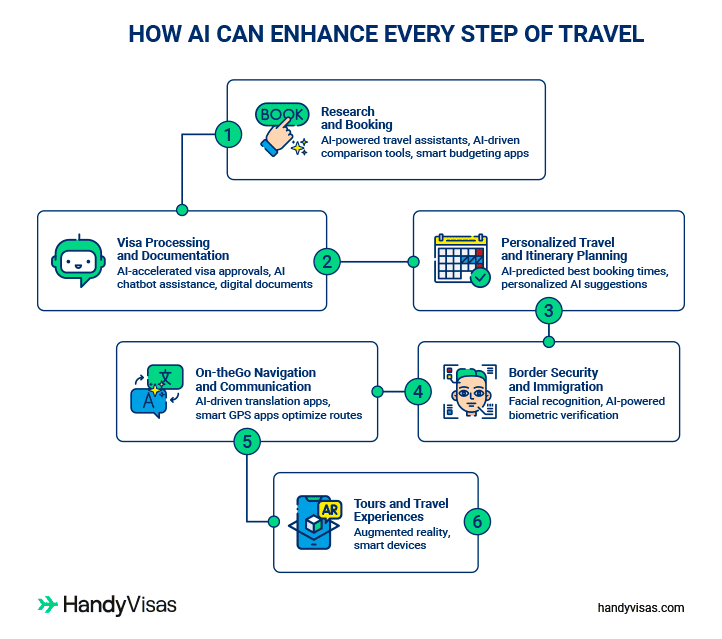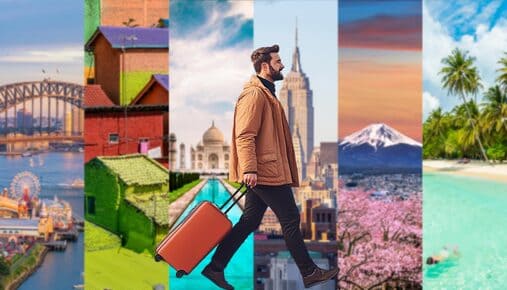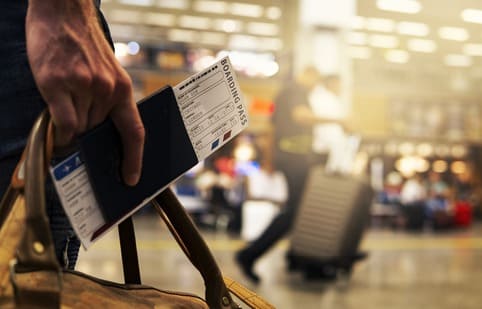Artificial intelligence is increasingly integrating into the tech-driven travel industry, affecting everything from digital visas and e-visa technology to border control processes.
Machine learning and AI can provide the most relevant and personalized information in seconds, enhancing the travel experience like never before. It’s no wonder that analysts say that by 2026, the AI market for travel will exceed $ 1.2 billion.

AI in Trip Planning
AI has already evolved into a personal travel assistant by using algorithms to suggest destinations that match each individual's preferences. It has already become the most popular way that travelers use AI – a survey among HandyVisas Facebook followers showed that 90% had used AI to plan or book their travel.
Thanks to machine learning, AI can recognize and adapt to users' changing interests and habits, making recommendations increasingly accurate and personalized over time.
For example, AI-powered travel assistants like ChatGPT, GuideGeek, and Google Trips can suggest destinations and accommodation based on your previous choices and other digital footprints.
Platforms like Kayak, TripAdvisor, and Booking.com, are also now relying on AI to simplify bookings, by providing real-time information on ticket pricing, hotel room availability, and rate comparisons.
AI in Visa Processing
AI is significantly reducing visa waiting times and improving the accuracy of applications.
With automated visa applications and advanced fraud detection systems, the risk of human error is minimized, providing more reliable and secure visa approvals. And it seems most of us are happy with AI doing some of the heavy lifting, with over 90% of respondents of another HandyVisas survey saying they would feel safe letting AI complete their visa application.
This technology is transforming the future of visa applications, simplifying the process for even some of the hardest-to-get visas.
Digital visas and e-visa technology, in addition to other tech-driven innovations, have also significantly improved the efficiency of visa application processes.
Countries offering visas for remote workers are also embracing these innovations, using automated chatbots and AI assistants to guide applicants through the visa process.
At HandyVisas, we use the latest technologies to simplify the process, verify documents and provide real-time assistance. This way, we can guarantee quick and hassle-free approvals for your visa application.
How AI helps with visa processing:
- Faster approvals – AI speeds up application processing.
- Reduces errors – Automated document checks prevent mistakes.
- Fraud detection – AI spots inconsistencies in applications.
- 24/7 assistance – AI chatbots guide applicants anytime.
AI and Personalized Itinerary Building
With travel automation and AI, the process of planning out a trip has also changed. Now you can create an itinerary in just a couple of minutes by simply providing your preferences.
In addition to ChatGPT, you can use plugins from different travel services, including KAYAK, OpenTable, and Trip.com, to create a travel plan based on recommendations, reviews, and experiences of other travelers.
There are even some services tailored for specific traveler types: GuideGeek and Tripnotes.ai, for example, which use the same principle as ChatGPT, but focus on smart travel innovations.
As Jar Kuznecov, CEO of Wonderplan, highlights:
“AI is transforming travel by making trips smarter, faster, and more personalized. From chatbots handling customer questions to AI-powered itinerary planning, technology is taking the hassle out of travel.”
AI at Passport Control
AI in travel is transforming border security by making it faster and more efficient. At passport control, biometric verification for visas, e-passports, and facial recognition technologies help significantly reduce wait times.
AI-driven border security is especially important for popular destinations, where visa processing can be complex and time-consuming.
At Amsterdam's Schiphol Airport and Berlin's Brandenburg Airport, face scanners are already used during boarding. Singapore's Changi Airport is even planning to eliminate passports, relying on biometric verification for visas and smart travel documents.
In addition to airports, railway stations, hotels, and restaurants are already testing facial recognition technology to improve customer experience. This allows travelers to bypass long lines at customs, get through security in just minutes, and even receive a personalized welcome at restaurants.
On-the-Go Communication & Navigation
Smart language assistants are a key part of travel automation and AI, eliminating language barriers across continents.
AI-driven translation tools such as Google Lens can instantly translate text seen through your camera, while AI chatbots in hotels and airlines further assist travelers in understanding information and getting support in different languages.
AI-driven navigation tools are also making travel easier by optimizing routes, predicting traffic, and suggesting attractions. Apps like Google Maps and Waze use AI to enhance travel efficiency for smoother, stress-free journeys.
Virtual Tours and Enhanced Experiences
The travel experience is another area significantly changed by AI in just a few years. Thanks to AI, virtual tours and augmented reality have become possible. You can now admire the Louvre’s masterpieces on a virtual tour of the museum, or dive into a 360-degree video to see the Great Barrier Reef.
But the real advance in the industry was made when TripAdvisor introduced its virtual voice tours with artificial intelligence in Orlando and Abu Dhabi. On these tours, online assistants guide people through the best tourist locations, cultural sites, restaurants, and bars.
The Museum of the Future in Dubai is one of the best examples of how Artificial Intelligence (AI), Virtual Reality (VR), and Augmented Reality (AR) can be used to create an immersive experience for visitors. These tech-driven solutions have revolutionized the way they perceive and interact with exhibits.
AI-generated travel content and immersive travel guides provide personalized insights, making each journey more engaging. Additionally, smart glasses offer real-time navigation and AI-powered photography, helping tourists capture moments and navigate unfamiliar places.
These digital transformations in travel are changing the way we explore the world, making us more independent of traditional travel tools and improving our ability to navigate and experience new destinations.
Enhance Your Trip With AI
Emerging technologies and AI are significantly improving the overall travel experience, making it more personalized and efficient.
To fully take advantage of these AI developments while you travel, make sure you’re fully prepared for your trip with the right documents. Many countries require a visa or travel authorization, and it’s essential to get these in advance.
HandyVisas makes the visa process simple and quick, so you can focus on enjoying your travels – whether they’re AI-assisted or not!



